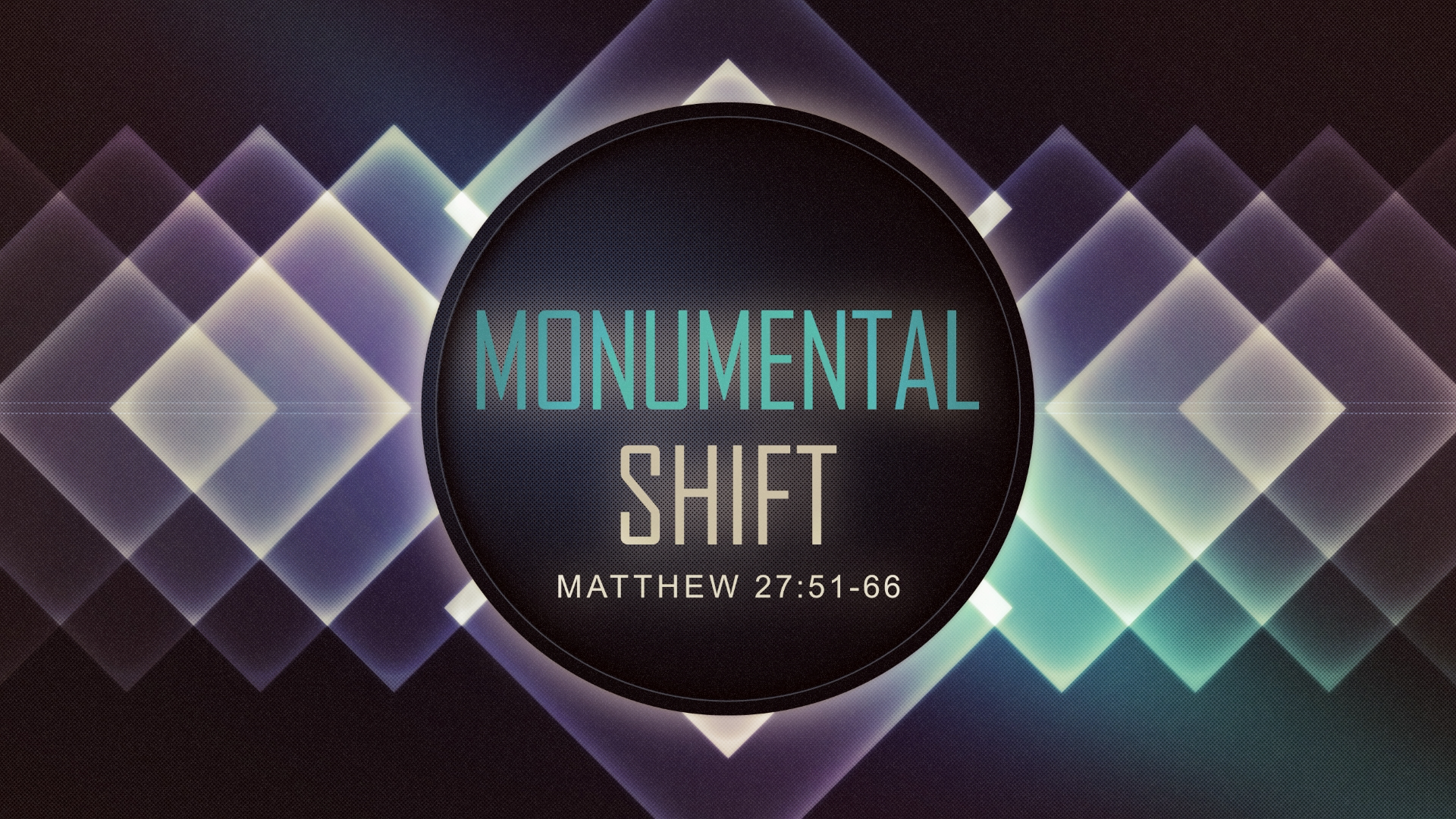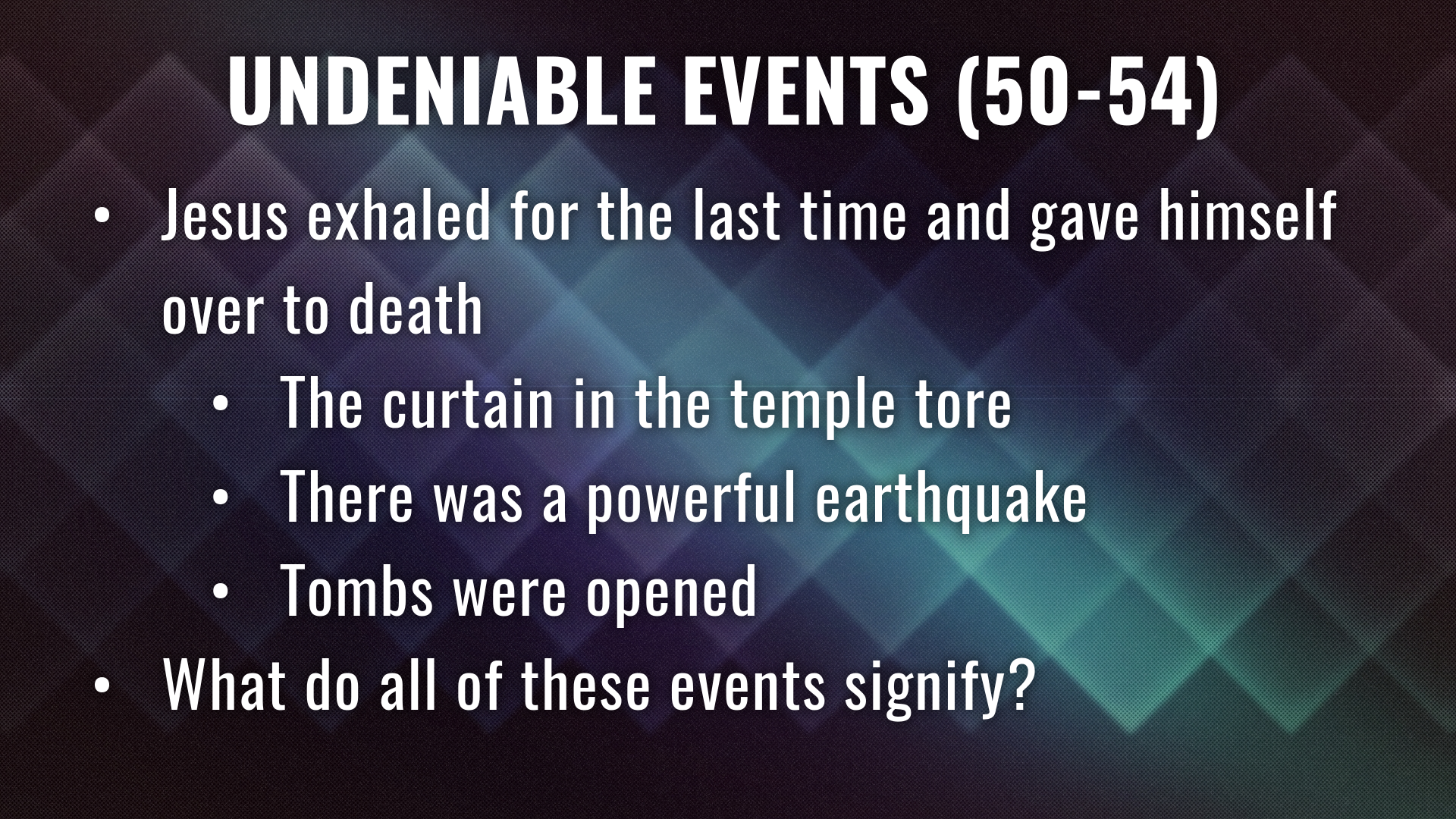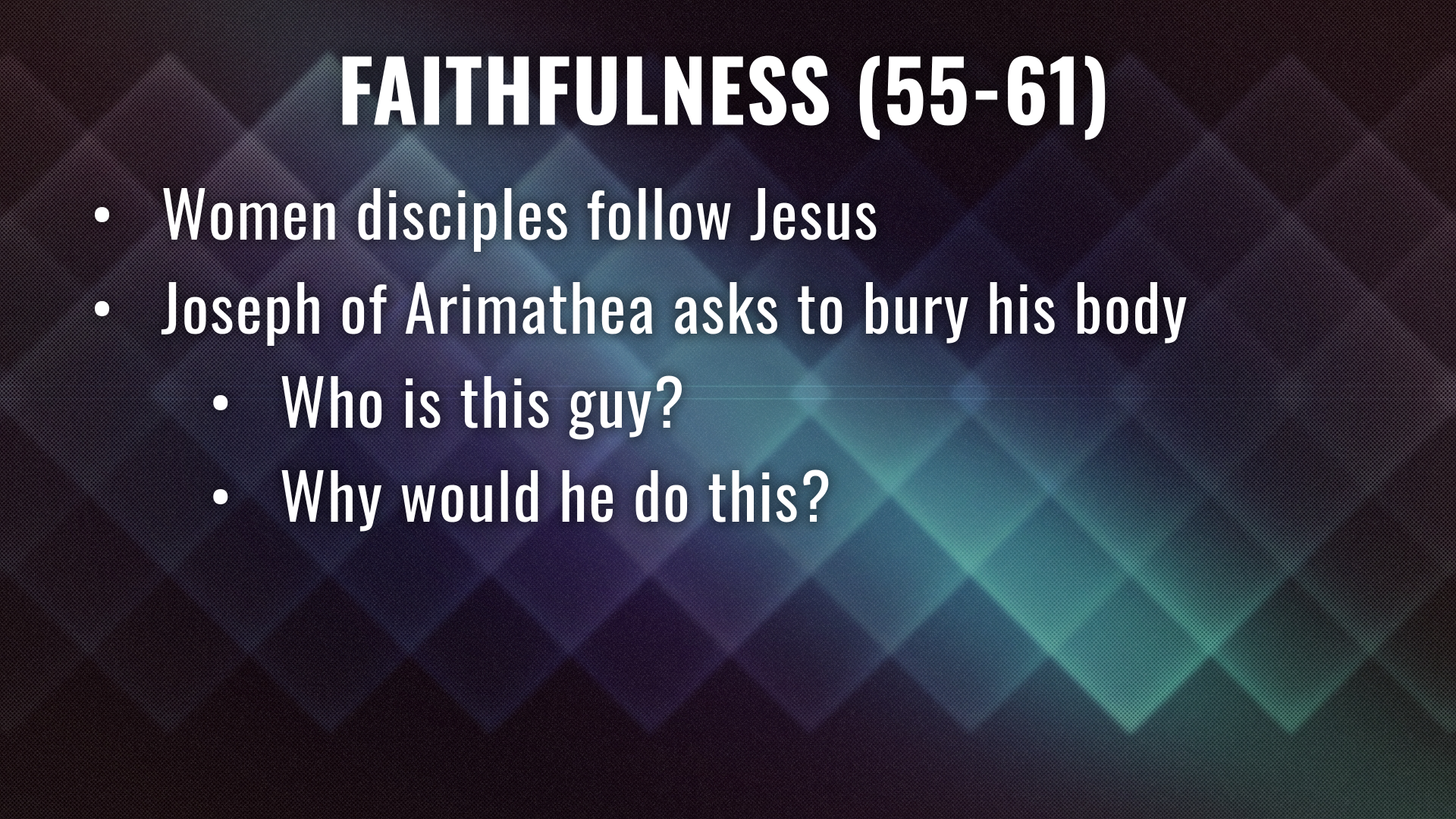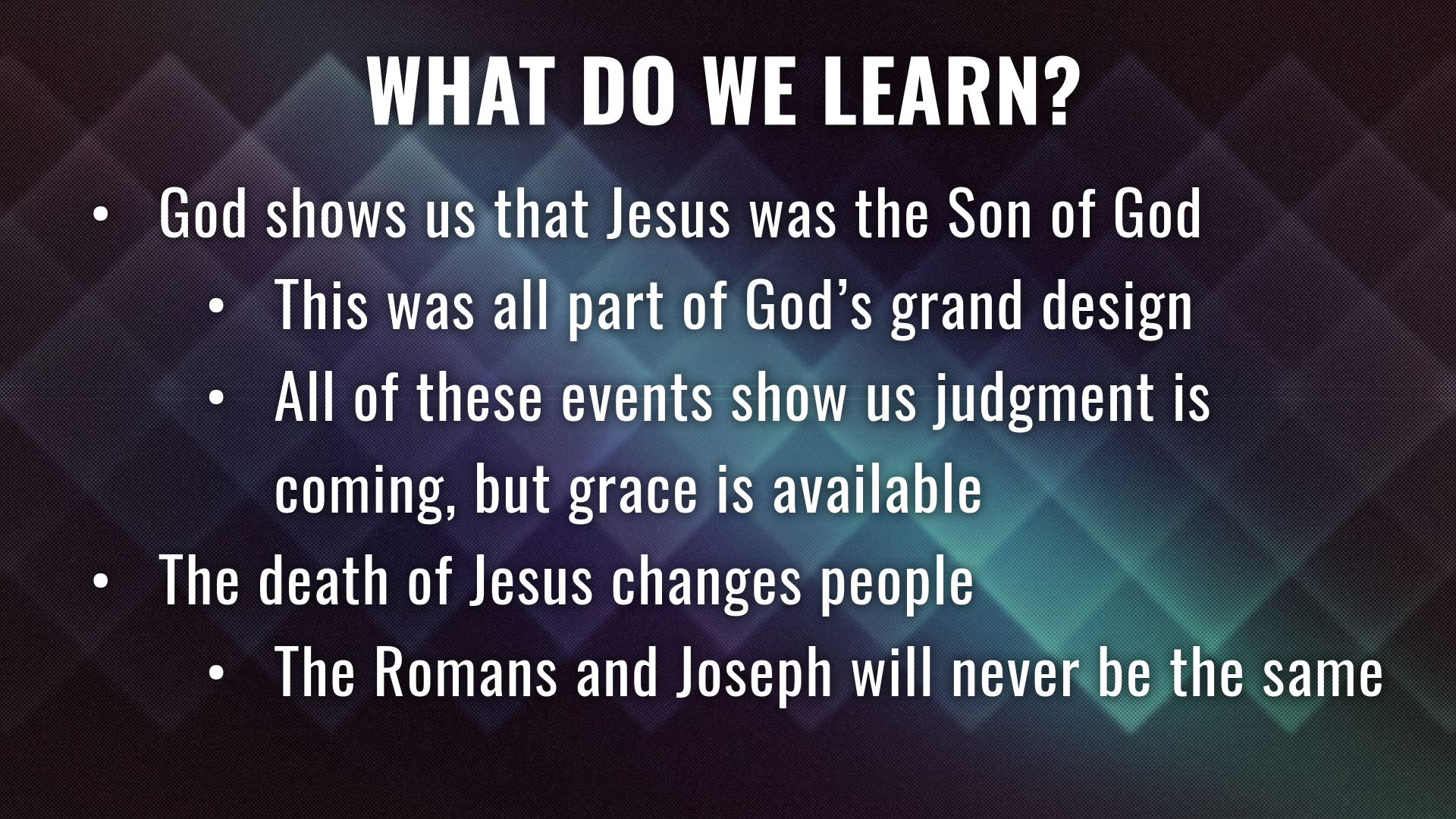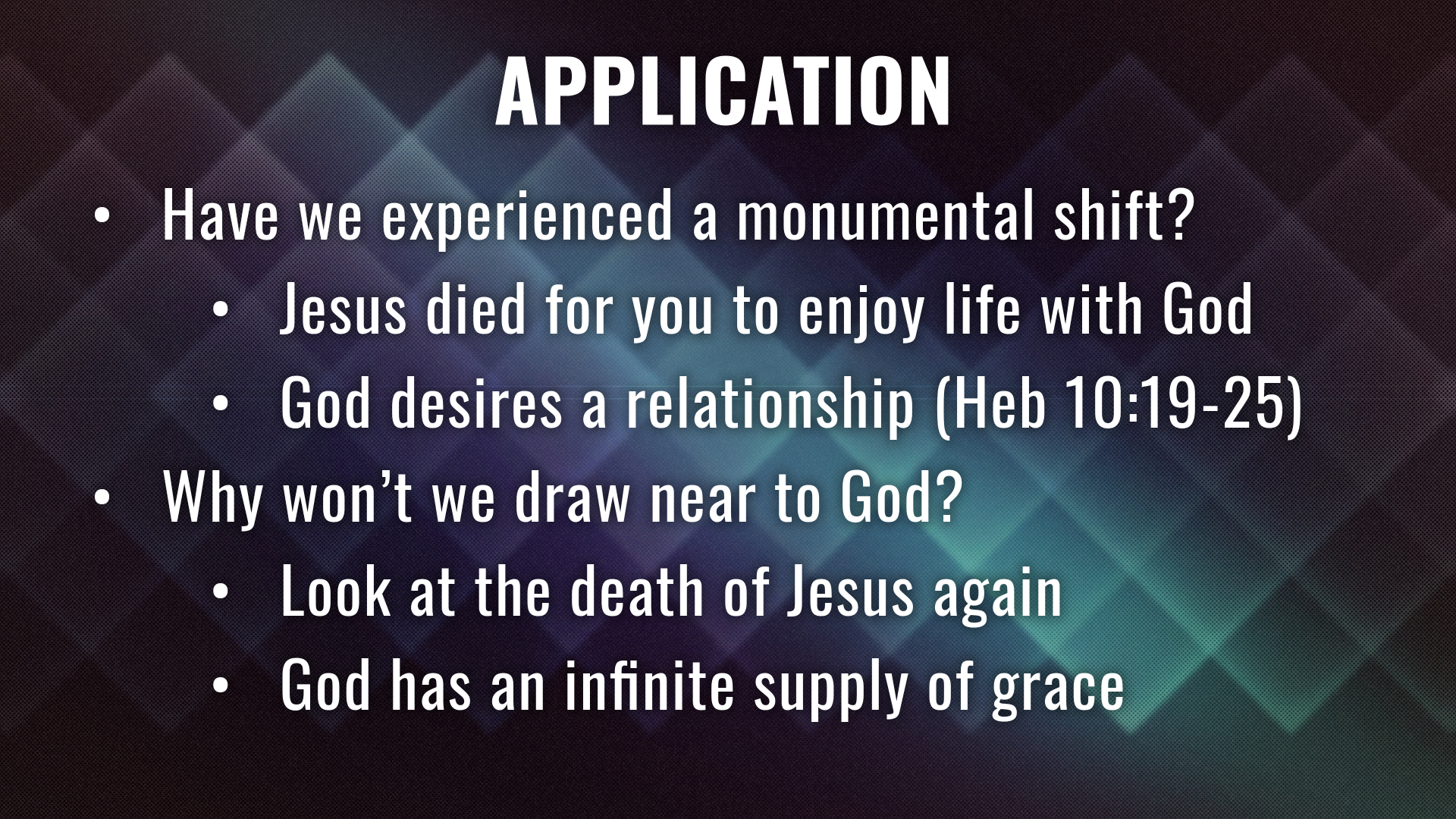Monumental Shifts (Matthew 27:51-61)
Have you ever had something monumental happen in your life that completely shifted your way of thinking? A couple of weeks ago, I mentioned that I picked on a boy in middle school. That was intended to help us all think about being mean and cruel to other people as we transitioned over to the soldiers being mean to Christ. I didn’t know it at the time, but it was a monumental shift in my thinking about popularity. It was the first and only time I remember ever being truly mean to someone who was innocent, and all I did was say some mocking words to him. I think I was in seventh grade, but it completely changed everything for me. Has that ever happened to you? There are a few other instances like that one, but that one seems to fit in so well with what we will be learning about today as we see some monumental shifts happening after the suffering of an innocent man, Jesus.
So far, we have walked through most of the book of Matthew. Jesus has been born to fulfill the scriptures. He lived to fulfill scriptures, and now he has suffered and died to fulfill scriptures. Matthew has made it abundantly clear that Jesus is the Messiah who God foretold throughout the Old Testament.
Jesus has just died after being mocked, humiliated, and spending six hours hanging on the cross. But around noon, three hours into the crucifixion, the sky turned unusually dark. At this point, Jesus quoted from Psalm 22 to let everyone know that he is still fulfilling scripture. Then he gave up his spirit. He died. Today, we will look at what happens after his death.
Undeniable Events
First, let’s look at the events right after Jesus died.
Matthew 27:50--54 (ESV) --- 50 And Jesus cried out again with a loud voice and yielded up his spirit. 51 And behold, the curtain of the temple was torn in two, from top to bottom. And the earth shook, and the rocks were split. 52 The tombs also were opened. And many bodies of the saints who had fallen asleep were raised, 53 and coming out of the tombs after his resurrection they went into the holy city and appeared to many. 54 When the centurion and those who were with him, keeping watch over Jesus, saw the earthquake and what took place, they were filled with awe and said, “Truly this was the Son of God!”
As soon as Jesus breathed his last breath, two things happened. The curtain of the sanctuary was torn from top to bottom, and there was an earthquake so strong that rocks were split in two. The third event that happens is the opening of the tombs. This one is very odd because Matthew tells us that the tombs open, but then he tells us that the saints rose after Jesus rose from the dead. Matthew jumps ahead in the story because he is discussing strange events after Jesus dies.
All of these events are given with purpose. They tell us that Jesus’ death was not your average Joe dying on the cross. When we join the earthquake with the darkness over the land and the tearing of the curtain, we get the impression that God is furious about what is going on. God made a statement that the Roman soldiers catch, but the Jews will not catch. They say, “Jesus is the Son of God.” There is no doubt about it. This almost seems like a warning shot to scare those in attendance. Notice the Roman soldiers, who were making fun of Jesus earlier, have become terrified, and they believe that Jesus is the Son of God. These are prominent scary soldiers that no one would dare mess with, but here they are, terrified over the darkness and the earthquake. They believe that Jesus is the Son of God, and they are concerned about what will happen to them.
The phrase “Son of God” is commonly used for Caesar. The Roman coin would often have some image of Caesar with the inscription that read Son of God. So this is a common phrase to associate with Caesar. To hear a Roman say it about Jesus is significant. This centurion may have submitted his life to Jesus upon hearing the truth. We will never know.
Faithfulness
Matthew 27:55--61 (ESV) --- 55 There were also many women there, looking on from a distance, who had followed Jesus from Galilee, ministering to him, 56 among whom were Mary Magdalene and Mary the mother of James and Joseph and the mother of the sons of Zebedee. 57 When it was evening, there came a rich man from Arimathea, named Joseph, who also was a disciple of Jesus. 58 He went to Pilate and asked for the body of Jesus. Then Pilate ordered it to be given to him. 59 And Joseph took the body and wrapped it in a clean linen shroud 60 and laid it in his own new tomb, which he had cut in the rock. And he rolled a great stone to the entrance of the tomb and went away. 61 Mary Magdalene and the other Mary were there, sitting opposite the tomb.
We read that not all of the disciples have abandoned Jesus. Three women have been following Jesus and watching from a distance. Matthew hasn’t told us anything about them so far in the story, and he doesn’t tell us very much about them here. But they have been caring for Jesus throughout his ministry. Now they are want to care for him after his death. We will hear more about them next week.
That evening, we read about another disciple, Joseph of Arimathea, who wants to bury Jesus in a tomb he owns near Golgotha. Consider the boldness of this man. On the day of Passover, he goes to Pilate and asks him for the body of Jesus. Going to a Gentiles area would make him unclean, and taking up a dead body would make him unclean. He gives up the Passover to serve Jesus. We read that he takes Jesus to a new tomb that he has cut out and wraps him in linen. He rolled a great stone in front of the tomb and went away. We aren’t told anything else about this man. He likely left to perform all the cleansing rituals needed for someone unclean.
What would possess this man to do this for Jesus? Joseph is mentioned in every gospel, and he is described as a member of the Sanhedrin Council. He was a disciple secretly because he feared the Jews until this day. But he took courage, went to Pilate, and asked for the body of Jesus. This is a bold and risky move. Why would he do this for a dead man?
What Do We Learn?
Do we see that Jesus died spectacularly because he was the Son of God? God’s stamp of approval is found in this text and the next one where we learn about his resurrection. This text makes it clear that Jesus isn’t some crazy person who decided not to fight against the evil religious leaders of his day. He was submitting to God’s will for him and pleasing his Heavenly Father.
In this text, God shows men that all of this is because of his grand design. He has allowed wickedness and used it to accomplish his purpose. Darkness over the whole land in the middle of the day without any storms wasn’t usual. Small earthquakes are typical in that area, but this text tells us that rocks were split. One of those events surrounding Jesus’ death could be viewed as a coincidence, but not together. People like these Roman soldiers would pause and reflect on what had happened. Tombs being opened and men rising from the dead is bizarre. There is no explanation for that. But consider perhaps the most symbolic event of the curtain of the holiest place being torn in two from top to bottom. God showed everyone that He was on Jesus’ side, but our side as well. He knew that the death of Jesus was the death of the eternal sacrifice, opening the way for all mankind. God simultaneously makes a statement about his judgment and a statement about his grace.
This brings us to the second thing we learn from this text. Do you see a great contrast? Previously we learned about how men were mocking Jesus and abusing him with complete disrespect. They worked their greatest wickedness against Jesus and demonstrated man’s wrath against God. But the soldiers who killed Jesus were able to perceive God’s hand. They knew that God was displaying a warning of future judgment, and they called it what it was. They went from mockingly calling Jesus king of the Jews to being full of awe as they said, “Jesus is the Son of God.”
Furthermore, when the body of Jesus needed to be buried, it just so happens that a wealthy Jewish leader was ready to do that, in fulfillment of Isaiah 53:9.
Isaiah 53:9 (ESV) --- 9 And they made his grave with the wicked and with a rich man in his death, although he had done no violence, and there was no deceit in his mouth.
The fact that Joseph had a new tomb near Golgotha and was willing to step out and ask for the body of Jesus is amazing. Joseph saw everything that took place and knew that he was here for this time. Not everyone could perceive what was going on, but some did, and they were changed by it.
Application
Has the death of Jesus changed you? Jesus loved us so much that he was willing to suffer and die on the cross for us. You can take part in that blessing. It doesn’t matter if you are guilty of mocking Jesus and all of his followers. If you see who he is and you want to be a part of his kingdom, the door is open for you to come in.
Maybe you are like the Roman soldiers. You have no tie to any actual religion. You are just an idolater who has been living impulse to impulse, moment to moment. Do you see what God has done? We can find the darkness and the earthquake on that day in other historical literature. The reaction of these soldiers is the appropriate reaction. Is it your reaction?
Maybe you are like Joseph. You believe in Jesus, but you don’t proclaim it for fear of the commitment that others would expect. The death of Jesus on the cross had such an impact on him that he missed out on one of the most fantastic days of the year. Has the death of Jesus had an impact on you?
What would it look like if we see the death of Jesus, feel the significance of this death, and submit our lives to the Son of God?
Would we make that confession? Would we admit that we are evil people and give up the old, selfish way of doing things? Instead of dominating people in a lower position, we could lift them up and show them love.
Or maybe you are more like Joseph. Would we step out of the shadows and embrace the possible consequences of joining ourselves to Jesus?
The death of Jesus impacts evil people because he was selfless for us. He went through all of that suffering willingly for us to be saved. It wasn’t fun or exciting. It didn’t give him the pleasure of defeating his enemies by ruling over them. It was the opposite of seeking to preserve himself. He let someone else do something that was highly unfair and unjust. He did all of that for you and me!
Remember that he tore the curtain for us. He made way for us to experience the fullness of God and be transformed. He didn’t do that because we were so great. We aren’t saved because we do all the right things. We are saved because he loves us, and we do all the right things in response to his love. Next time we will see how the resurrection has an impact on people, but if you need to confess and submit to Christ if his love for you has had an impact on your heart, will you let it be known so we can rejoice with you and help you take the next step?

